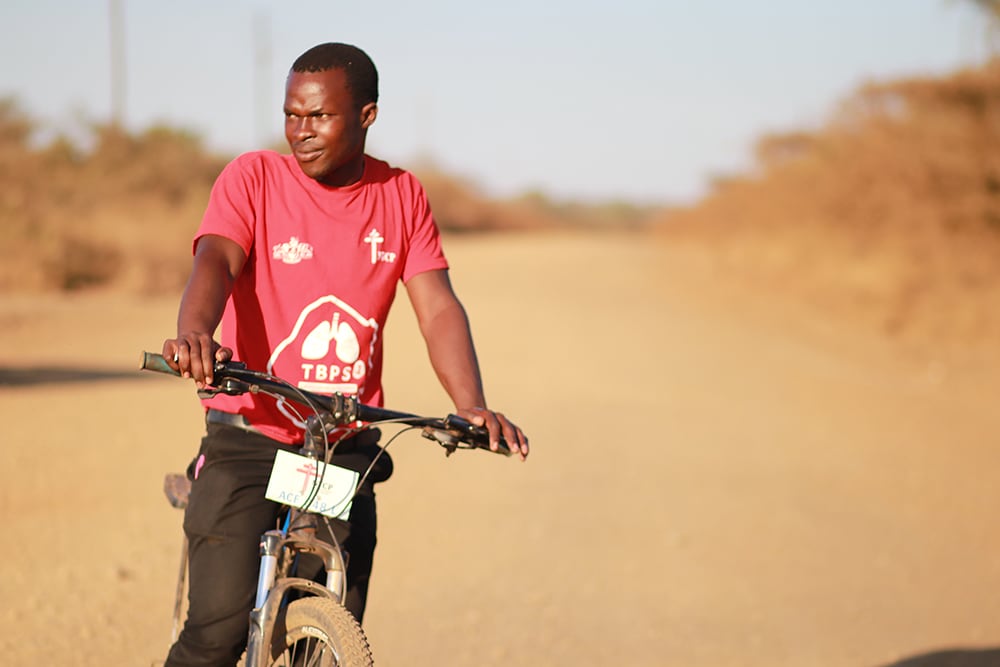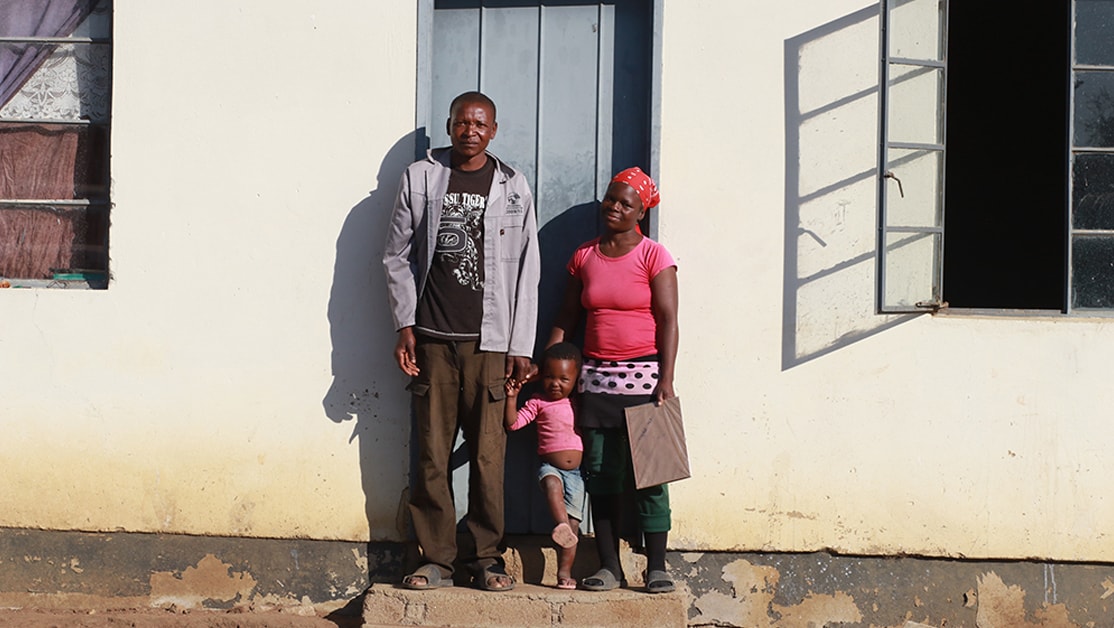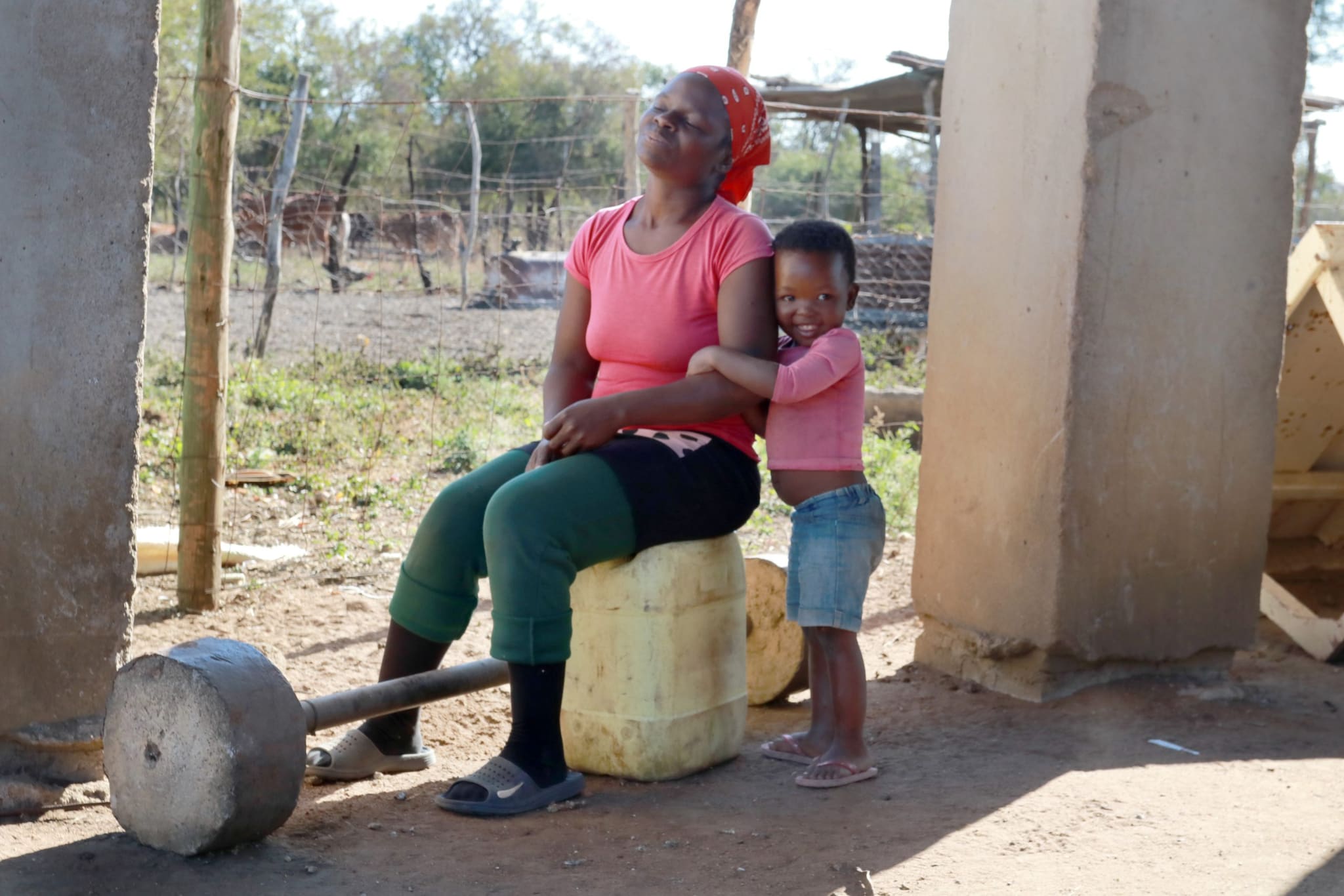At a glance
Despite being treatable and preventable, tuberculosis (TB) is one of the deadliest infectious diseases in the world, taking the lives of approximately 1.5 million people each year. It is also the number one cause of death among people living with HIV. Learn how CDC supports Eswatini in ending the TB epidemic.
Hope on two wheels

Brittany K. Moore
On a hot, sunny afternoon, Sifiso Nzima arrived at the Mndvoti homestead, a farm located in a remote, rural area in Eswatini's Lubombo region.
He's no stranger here. Just a week before, Sifiso had conducted routine outreach in the area, traveling miles on his sun-weathered bicycle and going door-to-door to screen families for tuberculosis (TB).
As one of Eswatini's TB community champions, Sifiso completed extensive training to look for signs of TB and other ailments in the families he serves. During his outreach and screening visit, Sifiso noticed that Mr. Mndvoti was coughing. He took a moment to teach the family about TB and asked if he could collect a sputum sample. He then transported the sample, by bicycle, to a TB laboratory.
When he came back, Sifiso returned with two things for Mr. Mndvoti: a positive test for TB and life-saving medication. As Sifiso explained what Mr. Mndvoti needed to know about his new medication, he realized other family members may also exhibit signs of TB.
That's when he noticed the Mndvoti's four-year-old daughter, Samkeliso. Something was off. Though she didn't have a cough, her body weight was far too low for a growing child. He urged the family to get the little girl to the nearest TB clinic as soon as possible for a TB test. They agreed.
All hands on deck
In the early 2000s, Eswatini was a country ravaged by the scourge of TB. By 2003, the kingdom had one of the world's highest TB death rates, with 18 out of every 100,000 people succumbing to the disease.
In 2011, the Government of Eswatini officially declared TB a national emergency. This paved the way for accelerated support from CDC, PEPFAR*, and other global partners. With additional technical expertise and financial support on their side, Eswatini launched a robust emergency intervention. Eswatini worked closely with CDC and partners to engage all sectors in the nation's response to TB – including the Ministry of Health, community organizations across the kingdom, chiefs, local political leaders, and government entities.
Thanks to the accelerated response, the nation began making significant strides in supporting individuals presumed or known to have TB to complete their full course of treatment. However, there remained an alarming number of undiagnosed TB cases in the population. In fact, in 2015, WHO estimated that nearly 40 percent of estimated cases of TB disease in Eswatini were undetected.
An innovative solution
To address the issue of missing TB cases head-on, the National TB Programme expanded its community-based efforts. It engaged with each of the 369 chiefdoms in Eswatini, asking each chief to nominate a representative from their region to serve as a TB "community champion."
Each community champion, in turn, would coordinate with their local TB clinic to identify individuals known to have TB. The champions would then travel, by bicycle, to homesteads or churches to reach anyone who may have come into contact with one of the TB patients.
Each champion was trained to recognize TB symptoms as well as symptoms of other diseases – from conditions like asthma or diabetes to infectious diseases like malaria or HIV. For anyone with a suspected case of TB, the community champion would help them get tested and, if needed, would deliver medication directly to their homestead.
Sifiso’s path
Sifiso is the TB community champion for Eswatini's Lubombo region. He travels miles down long stretches of dusty roads on his bicycle to visit at least five homesteads each day, reaching nearly 100 families per month. He is well known in this area — and well trusted. When he visits a home, he screens household members for TB symptoms. He also collects sputum samples from anyone with a cough and transports the samples, via bike, to the nearest TB laboratory for testing.
If a person tests negative for TB, Sifiso teaches them how they can stay TB-free, then refers them to the clinic for follow up on symptoms that can be caused by conditions other than TB. If the person tests positive for TB, Sifiso returns to the home to deliver their medication directly. He also follows up regularly with visits to confirm people take their medicine correctly and makes sure to screen any close contacts for TB symptoms.
A life-saving decision

Photo by: Brittany K. Moore
Back on the remote farm in Lubombo, the little girl Sifiso sent for testing – despite not having a cough – tested positive for TB.
If not for Sifiso's training, dedication, and instincts, the Mndvoti family may have never known of her diagnosis. Even though it is treatable, when undiagnosed, TB can quickly cause serious illness or death. This is especially true when young children have the disease. In fact, the WHO estimates that 95 percent of children who die from TB each year, worldwide, did not receive treatment.
Fact
Thanks to Sifiso, however, Samkeliso began treatment immediately. After just two weeks, her health began to improve. Today, she is fully cured.
"This girl recovered very fast," recalls Sifiso. "She is well now, and I'm very happy about that."

Photo by: Brittany K. Moore
By all accounts, Sifiso is a committed outreach worker. "He has a passion for serving his community," says Joyce Sibanda, National TB/HIV Community Services Coordinator at the Eswatini Ministry of Health.
Success stories like this have been repeated across the country. In 2004, the Eswatini TB program found just under one-third (31%) of all estimated TB cases in the kingdom. Thanks to national and community outreach efforts, the country nearly doubled this number in 2020, successfully finding nearly 60 percent (58%) of all estimated TB cases.
"To improve the quality and coverage of TB services in Eswatini, we knew we needed an innovative approach," says Dr. Michelle Adler, CDC-Eswatini Director. "Community-focused interventions in Eswatini have been a critical component of the multifaceted strategy to improve both service delivery and systems strengthening."
It's a strategy that has worked. Since the state of emergency was declared in Eswatini in 2011, the nation has seen dramatic improvements in its TB response. Between 2011 and 2020, reported TB cases in the nation declined sharply – from 11,000 new cases to just over 2,000 cases. TB-related deaths also plummeted by approximately 75 percent during that time.
“There’s a reason we are here,” says Joyce, “to save lives!”
It's a sentiment Sifiso echoes.
*U.S. President's Emergency Plan for AIDS Relief
Despite being treatable and preventable, TB is one of the deadliest infectious diseases in the world, taking the lives of approximately 1.5 million people each year, and the number one cause of death among people living with HIV. CDC is on the frontlines in more than 25 high burden countries working to find, cure, and prevent TB and help sustain country efforts.
With partner governments worldwide, CDC is working to increase access to enhanced screening and diagnostics; identify and expand better treatment regimens; break the cycle of transmission; address pediatric TB, and help lead global efforts to scale up TB preventive treatment for those most vulnerable to the disease.
